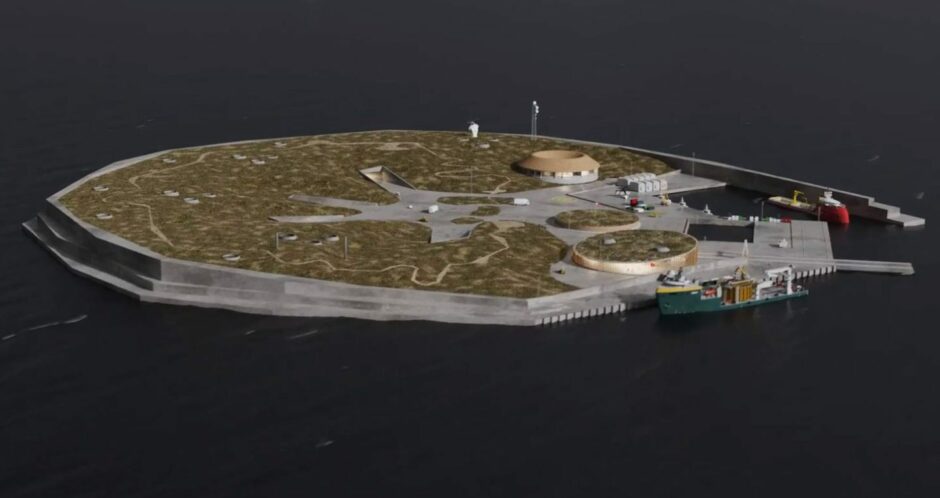
Former Prime Minister Gordon Brown has backed plans for a new grid to help deliver low carbon power across Europe, as part of a new report charting a second life for the North Sea.
Published by thinktank Our Scottish Future and authored by energy expert Nick Butler, the ‘North Sea 2’ paper proposes establishing a grid that would connect a vast network of wind power, carbon capture and storage and hydrogen facilities across the basin.
In a foreword to the report, Mr Brown says that the development of a North Sea grid is “an idea whose time has now come”, and that backing these key technologies would see the UK “generating more income and employment and Aberdeen enjoying a second renaissance as a centre for the new North Sea of the future.”
However, it comes as the Labour party remains under fire for manifesto proposals to hike windfall taxes and remove investment allowances for oil and gas firms, which business leaders say would decimate the sector.
Mr Brown notes that almost all North Sea infrastructure currently relates to oil and gas fields, alongside a small a number of electricity interconnectors. A full North Sea grid would incorporate these point-to-point links and create additional links between various offshore wind farms within a single system.
“A North Sea grid in its own right, connected not just by physical infrastructure but by technology through a central control system, could harness the wind more effectively and manage this supply of additional energy, distributing energy in a way that does more to compensate for the intermittency of onshore wind and yet maximises the use of existing reserves and thus increases their productivity,” Mr Brown says.
Development of offshore wind sector is currently stalled, he continues, because the UK grid cannot connect new supplies quickly enough due to planning constraints and supply chain challenges which are pushing up costs.
“A new government must solve those problems if we are to reach our existing targets, including the target of net zero by 2050,” he adds.
A larger blueprint would create “a single network” across the sea with connections to all neighbouring countries, offering access to “multiple sources of supply” of electricity and carbon storage assets.
Similar proposals have already been mooted in Danish waters, where developers such as Copenhagen Infrastructure Partners have proposed artificial wind and hydrogen islands, though recent updates suggest financing issues could preclude the plans.
And in 2022 energy ministers from Denmark, Germany, Belgium and the Netherlands have pledged to install at least 150GW of offshore wind and hydrogen by 2050, and to co-operate on developing interlinked offshore networks.
“Norway is ready to discuss a North Sea grid. Germany has already said it favours such a venture. All the European Union countries including France, Germany, Belgium, and the Netherlands close to the North Sea have much to gain from such an enterprise,” he writes.
“Now that the UK has rejoined the North Sea’s wind cooperation group and put offshore wind projects out to tender in a more commercial way, we could start to move forward with confidence.
“If we do this well, North Sea 2 could be even more successful for Britain than North Sea 1.”
GB Energy key
The report also backs proposals by shadow climate change Secretary Ed Miliband to create a new ‘GB Energy’, which it says should also be charged with creating and implementing a low-carbon development plan for the UK North Sea in tandem with other countries.
With a larger remit, GB Energy could also provide investment guarantees and take a leading role in building alliances with comparable state-owned companies, the report proposes.
Yet Mr Butler also notes that the investment required to fund many of these projects “will only be available if private sector participants have confidence in the stability and continuity of policy and Government support.”
He this calls for the establishment of “a distinctive tax regime for the UKCS” with the objective of maintaining and growing activity across the energy sector.
It echoes calls from trade body Offshore Energies UK (OEUK) for a more “holistic” approach to tax and investment around the sector, and the need for a new independent body to set the policy direction to encourage
However, the report also follows Labour Party manifesto proposals to hike windfall taxes and remove “loopholes” that enable oil and gas firms to recoup funds for reinvestment. The pledges met with an excoriating response from business leaders, and warnings that investment in the North Sea could dry up, leading to the loss of tens of thousands of jobs.
Last week, consultancy Wood Mackenzie also warned that CCS projects and some key offshore wind projects which are part-funded by oil and gas revenues “are at risk of being delayed or shelved altogether” if the plans result in an exodus of capital.
Recommended for you

 © Supplied by CIP
© Supplied by CIP